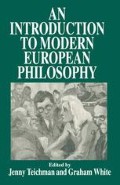Abstract
Martin Heidegger was born in 1889 in Messkirch, a village in Baden, south Germany. He studied theology and philosophy at the university of Freiburg from 1909 to 1914, reading a wide variety of both philosophical and non-philosophical texts — Brentano, Husserl, Rickert, Nietzsche, Kierkegaard, Dostoevesky, Rilke, and Trakl. At the time, the three dominant philosophical schools were phenomenology, neo-Kantianism, and neo-Thomism, and Heidegger was, in one way or another, influenced by all of them.
Access this chapter
Tax calculation will be finalised at checkout
Purchases are for personal use only
Preview
Unable to display preview. Download preview PDF.
Bibliography
H.L. Dreyfus, Being-in-the-World: A Commentary on Heidegger’s Being and Time, Distinction I Cambridge, MA: MIT Press. 1991.
C. Guignon (ed.), The Cambridge Companion to Heidegger, Cambridge: Cambridge University Press 1993.
M. Haar, Le chant de la terre, Paris: L’Herne 1987.
M. Heidegger, Being and Time, tr. Macquarrie and Robinson, New York: Harper and Row 1962.
M. Heidegger, Basic Writings, ed. D.F. Krell, New York: Harper and Row 1977.
G. Neske and E. Kettering (eds.), Martin Heidegger and National Socialism: Questions and Answers, tr. L. Harries, New York: Paragon 1990.
Editor information
Editors and Affiliations
Copyright information
© 1995 Palgrave Macmillan, a division of Macmillan Publishers Limited
About this chapter
Cite this chapter
White, G. (1995). Martin Heidegger. In: Teichman, J., White, G. (eds) An Introduction to Modern European Philosophy. Palgrave Macmillan, London. https://doi.org/10.1007/978-1-349-24232-0_9
Download citation
DOI: https://doi.org/10.1007/978-1-349-24232-0_9
Publisher Name: Palgrave Macmillan, London
Print ISBN: 978-0-333-63072-3
Online ISBN: 978-1-349-24232-0
eBook Packages: Palgrave Religion & Philosophy CollectionPhilosophy and Religion (R0)

